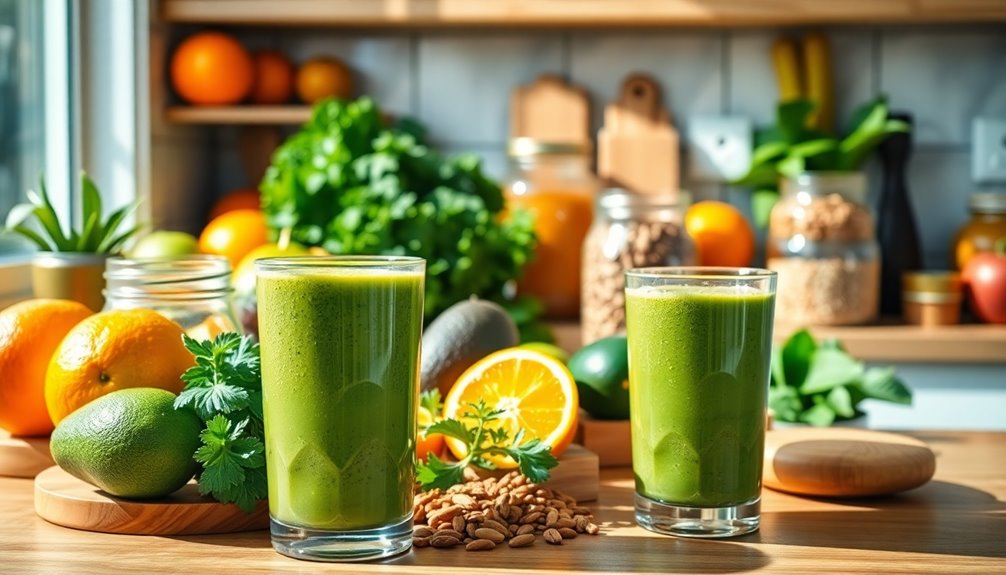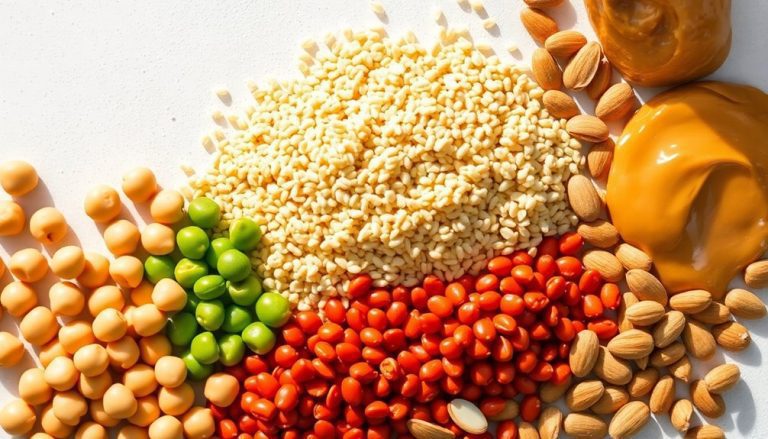If you're looking for natural alternatives to vitamin supplements, you've got plenty of options. Start by adding leafy greens, berries, and whole grains to your meals for a nutrient boost. Incorporate legumes and fatty fish for protein and essential fatty acids. Don't forget about eggs, which are great for muscle health, and nuts and seeds for healthy fats. Fermented foods like yogurt and kimchi enhance gut health, while herbs and spices like turmeric and garlic add flavor and antioxidants. Explore these nutritious foods further, and you'll find even more ways to support your health naturally.
Key Takeaways
- Leafy greens are nutrient-dense, providing essential vitamins and minerals, making them a great natural alternative to vitamin supplements.
- Berries offer antioxidants, vitamins, and minerals that support overall health, serving as a delicious substitute for synthetic vitamins.
- Whole grains, rich in fiber and nutrients, reduce chronic disease risk and can provide the necessary vitamins often found in supplements.
- Fermented foods like yogurt and kimchi are packed with probiotics, enhancing gut health and overall well-being, serving as a natural alternative to supplements.
- Nuts and seeds are excellent sources of healthy fats and essential nutrients, providing a nutritious alternative to vitamin supplements when consumed in moderation.
Leafy Greens
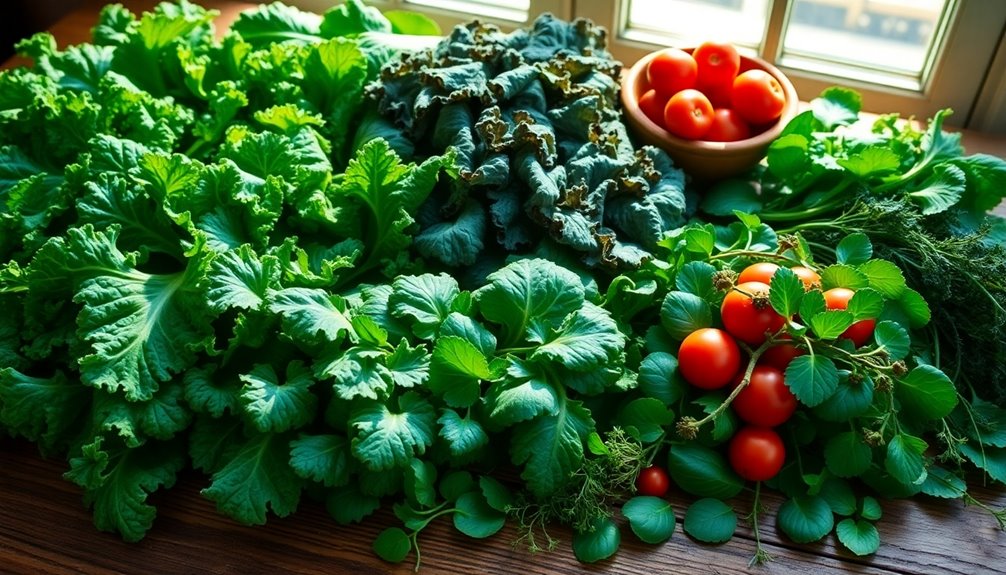
Leafy greens are some of the most nutrient-dense foods you can add to your diet. They pack a powerful punch of vitamins and minerals that support overall health. When you include kale, spinach, and Swiss chard in your meals, you're boosting your intake of vitamins A, C, and K, along with essential minerals like iron and calcium. Additionally, using quality plant food can help ensure your leafy greens thrive and provide maximum nutrients.
Not only do these greens nourish your body, but they also provide antioxidants that help fight inflammation and protect your cells. You might find it easy to incorporate them into your meals; toss them in salads, blend them into smoothies, or sauté them as a tasty side dish.
Aim to fill your plate with a variety of leafy greens to maximize their benefits. Each type offers a unique array of nutrients, so don't hesitate to experiment with different flavors and textures.
Plus, they're low in calories, making them an excellent choice for weight management. Additionally, growing your own leafy greens can enhance your meals with fresh herbs and flavors, providing an even greater nutritional boost.
Nuts and Seeds
Nuts and seeds are fantastic additions to your diet, offering a rich source of healthy fats, protein, and essential nutrients. These tiny powerhouses can provide you with energy, support heart health, and even promote weight management. By incorporating a variety of nuts and seeds into your daily meals, you'll enjoy numerous health benefits. Additionally, wearing gardening gloves while preparing and handling these foods can help keep your hands clean and protected. Furthermore, using claw garden gloves can enhance your gardening experience, making tasks easier and more efficient.
Here's a quick look at some popular nuts and seeds and their key advantages:
| Nuts/Seeds | Benefits |
|---|---|
| Almonds | High in vitamin E and magnesium |
| Walnuts | Rich in omega-3 fatty acids |
| Chia Seeds | Packed with fiber and antioxidants |
| Pumpkin Seeds | Great source of zinc and protein |
Include nuts and seeds in your snacks, salads, or smoothies to reap their benefits. A handful of almonds or a sprinkle of chia seeds can elevate your meals while helping you meet your nutritional needs. Remember, moderation is key; while they're healthy, they're also calorie-dense. So, enjoy these nutrient-rich foods and boost your overall health naturally!
Berries
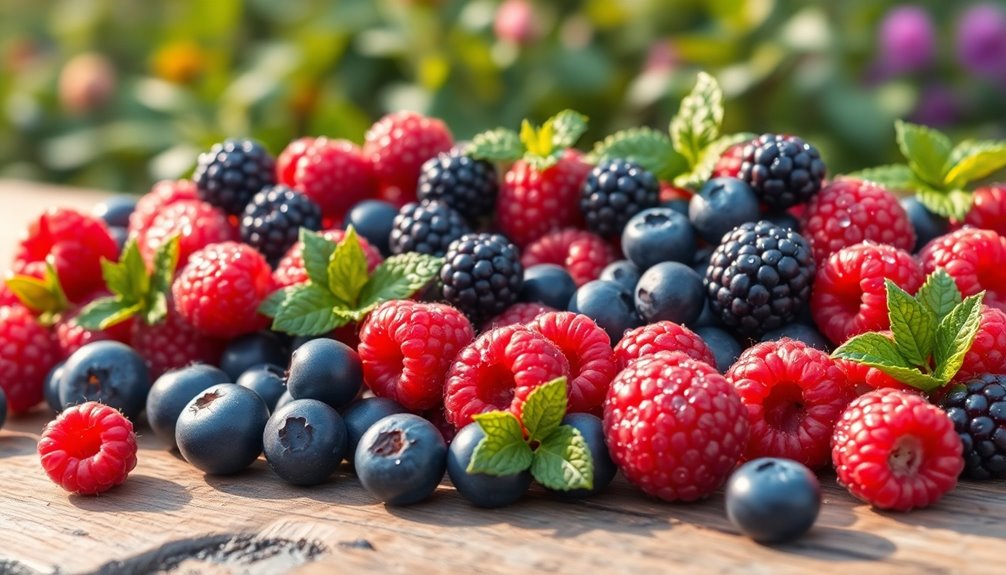
Berries are among the most nutrient-dense foods you can add to your diet, providing a burst of flavor and a wealth of health benefits. Packed with antioxidants, vitamins, and minerals, they help fight inflammation and protect your cells from damage.
Blueberries, for instance, are renowned for their high levels of antioxidants called anthocyanins, which may improve brain function and support heart health.
Strawberries are another fantastic option; they're rich in vitamin C, which boosts your immune system and promotes healthy skin. Raspberries and blackberries offer a good dose of fiber, aiding in digestion and helping you feel fuller for longer.
You'll love how easy it's to incorporate berries into your meals—throw them into smoothies, mix them into yogurt, or enjoy them as a snack. Additionally, many berries also contain natural compounds that can help deter pests, making them a great choice for insect-repelling plants in your garden.
When you choose fresh or frozen berries, you're not just treating your taste buds; you're also nourishing your body. Experiment with different types and discover which ones you enjoy the most.
Fermented Foods
When it comes to boosting your gut health, fermented foods are a powerhouse option worth exploring. These foods, like yogurt, kimchi, sauerkraut, and kombucha, are rich in probiotics, which help restore and maintain the balance of beneficial bacteria in your digestive system.
By incorporating these foods into your diet, you're not just enhancing your gut health; you're also supporting your immune system and improving overall well-being.
Eating fermented foods can lead to better nutrient absorption, as the probiotics help break down food more effectively. This means you'll get more vitamins and minerals from the meals you consume.
Plus, the fermentation process often increases the bioavailability of nutrients, making it easier for your body to utilize them.
You don't have to go overboard—just a small serving a few times a week can make a difference. Experiment with different types of fermented foods to find out what you enjoy the most.
Whether you're adding a dollop of yogurt to your smoothie or savoring a side of kimchi with dinner, you'll be doing your gut a favor.
Whole Grains
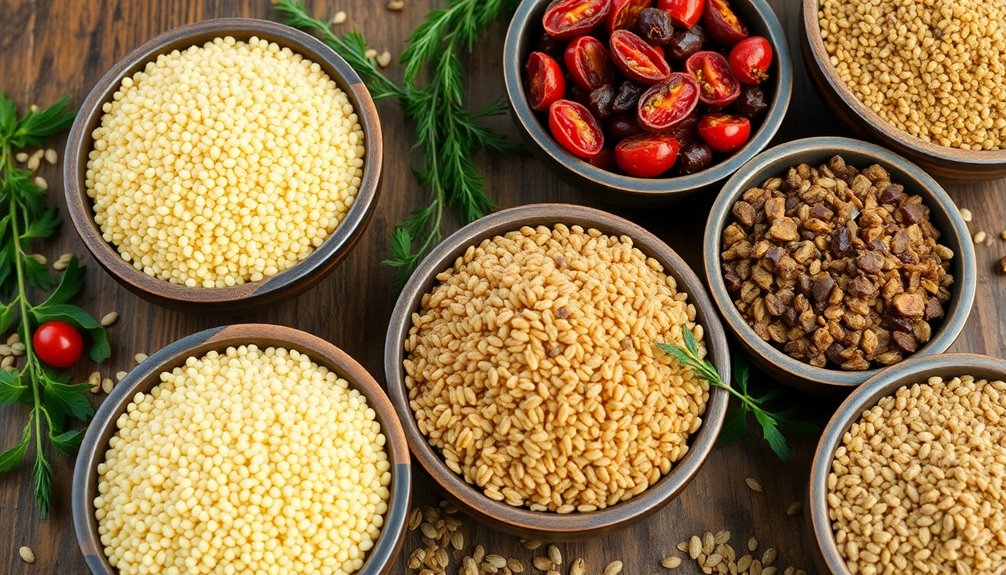
In addition to fermented foods, whole grains are another excellent way to enhance your diet and boost your overall health. They're packed with essential nutrients, including fiber, vitamins, and minerals, which can help reduce the risk of chronic diseases. Incorporating whole grains into your meals can improve digestion, help maintain a healthy weight, and provide sustained energy throughout the day.
Here's a quick look at some popular whole grains and their benefits:
| Whole Grain | Nutritional Benefits | Common Uses |
|---|---|---|
| Quinoa | High in protein and gluten-free | Salads, bowls, and as a side dish |
| Brown Rice | Rich in fiber and B vitamins | Stir-fries, casseroles, and sushi |
| Oats | Great source of soluble fiber | Breakfast porridge and smoothies |
| Barley | Contains antioxidants and fiber | Soups, stews, and salads |
| Whole Wheat | High in iron and magnesium | Breads, pastas, and baked goods |
Citrus Fruits
Citrus fruits are a fantastic addition to your diet, offering a wealth of vitamins and minerals that can support your immune system and overall health. These juicy fruits, like oranges, lemons, limes, and grapefruits, are packed with vitamin C, which helps boost your immune function and can reduce the duration of colds.
Besides vitamin C, citrus fruits contain antioxidants that combat free radicals, promoting skin health and reducing inflammation. You'll also find essential nutrients like potassium and folate, which play crucial roles in heart health and cell function.
Incorporating citrus fruits into your meals is simple. You can add slices of lemon or lime to your water for a refreshing twist or toss orange segments into a salad for a burst of flavor. Enjoying a grapefruit for breakfast not only satisfies your sweet tooth but also contributes to your daily nutrient intake.
Don't forget about the zest! The peel holds aromatic oils and additional nutrients, so try grating some lemon or orange zest into your dishes for a flavorful kick.
Legumes
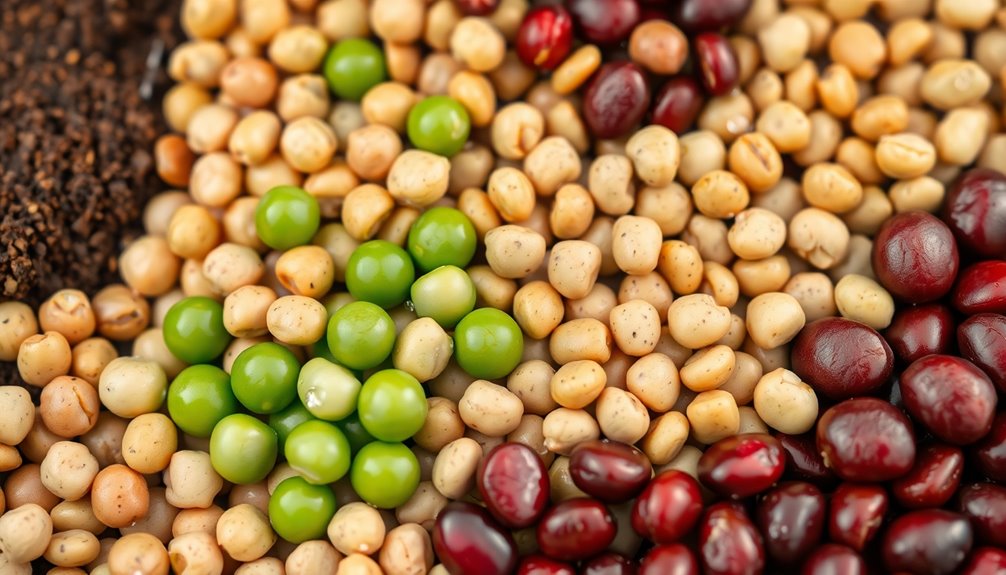
Legumes are another powerhouse of nutrition that can easily complement a healthy diet. These nutrient-dense foods are packed with protein, fiber, and essential vitamins, making them an excellent alternative to vitamin supplements. Incorporating legumes into your meals can help you meet your dietary needs while enjoying delicious flavors and textures.
Here are some key benefits of adding legumes to your diet:
- High in Protein: They provide a great plant-based protein source, making them perfect for vegetarians and vegans.
- Rich in Fiber: Legumes support digestive health and can help regulate blood sugar levels.
- Loaded with Nutrients: They contain important vitamins and minerals, including iron, folate, and magnesium.
- Versatile Ingredients: From salads to soups, legumes can be easily added to a variety of dishes.
You can enjoy lentils, chickpeas, black beans, and peas in countless recipes.
By choosing legumes as a staple in your diet, you'll not only nourish your body but also savor the diverse culinary possibilities they offer.
Fatty Fish
When it comes to boosting your health, fatty fish really stand out as a top-notch choice. Rich in omega-3 fatty acids, these fish offer a plethora of benefits that are hard to ignore. If you want to support your heart health, incorporating salmon, mackerel, or sardines into your diet can make a significant difference. Omega-3s help reduce inflammation, lower blood pressure, and may even improve cholesterol levels.
Not only does fatty fish contribute to cardiovascular health, but it also plays a vital role in brain function. Eating fatty fish regularly can enhance memory and may reduce the risk of cognitive decline as you age. It's like giving your brain the fuel it needs to operate at its best.
In addition to omega-3s, fatty fish are also a fantastic source of high-quality protein and essential vitamins, including vitamin D and B12. You don't have to worry about popping pills when you can enjoy delicious meals with these nutrient-packed options.
Aim for at least two servings of fatty fish each week to harness these health benefits and keep your body thriving. So grab a fillet and dive into a healthier lifestyle!
Herbs and Spices

While you mightn't think of herbs and spices as powerful health boosters, incorporating them into your meals can significantly enhance your well-being.
These natural flavor enhancers are packed with antioxidants, vitamins, and minerals that contribute to various health benefits.
Let's take a closer look at some of the must-have herbs and spices you should consider adding to your diet:
- Turmeric: Known for its anti-inflammatory properties, turmeric contains curcumin, which may improve joint health and reduce inflammation.
- Ginger: This spice is great for digestion and can help alleviate nausea and settle an upset stomach.
- Garlic: Garlic isn't just a flavor enhancer; it's also linked to improved immune function and heart health.
- Cinnamon: This aromatic spice may help regulate blood sugar levels and has potent antioxidant properties.
Eggs
Incorporating a variety of foods into your diet can significantly boost your health, and eggs are a fantastic addition. Packed with essential nutrients, eggs provide a great source of protein and are rich in vitamins like B12, D, and choline. They're versatile, easy to prepare, and can be included in countless dishes, making them a staple in many kitchens.
Here's a quick breakdown of the benefits you'll get from eggs:
| Nutrient | Benefit | Source |
|---|---|---|
| Protein | Supports muscle health and repair | Eggs |
| Choline | Aids brain function and development | Eggs |
| Vitamin D | Boosts immune system and bone health | Eggs |
Frequently Asked Questions
Can I Get Enough Vitamins From a Plant-Based Diet?
Yes, you can get enough vitamins from a plant-based diet! By incorporating a variety of fruits, vegetables, whole grains, nuts, and seeds, you'll ensure your body receives essential nutrients for optimal health.
How Do Cooking Methods Affect Nutrient Retention in Foods?
Did you know that boiling veggies can cause a 50% loss in nutrients? To maximize nutrient retention, try steaming or microwaving instead. These methods help preserve vitamins, ensuring you get the most from your meals.
Are There Any Risks of Overdosing on Natural Food Sources?
Yes, you can overdose on certain nutrients from natural food sources, especially fat-soluble vitamins like A, D, E, and K. It's essential to maintain a balanced diet and not excessively consume any particular food group.
How Do I Know if I'm Missing Essential Nutrients?
Imagine a garden; if flowers wilt, something's missing. To know if you're lacking essential nutrients, watch for signs like fatigue or skin issues. Regular check-ups and balanced meals help keep your personal garden thriving.
Can Natural Sources Replace Vitamin Supplements Entirely?
Yes, natural sources can often replace vitamin supplements entirely, as long as you consume a balanced diet rich in fruits, vegetables, whole grains, and proteins. Just ensure you're getting enough variety to meet your nutritional needs.
Conclusion
Incorporating these natural alternatives into your diet is like painting with vibrant colors on a blank canvas. Each bite of leafy greens, nuts, or berries adds depth and flavor to your health journey. By choosing whole foods over supplements, you're nourishing your body with nature's finest offerings, transforming your meals into a symphony of taste and wellness. So, embrace the bounty of the earth, and let these wholesome foods be your guide to a healthier, happier you!

